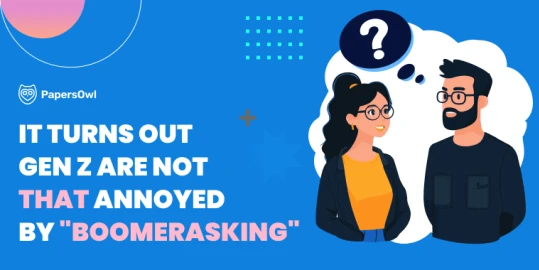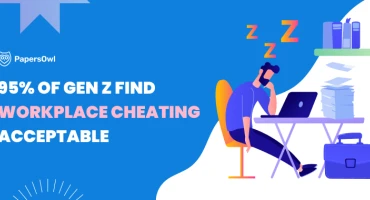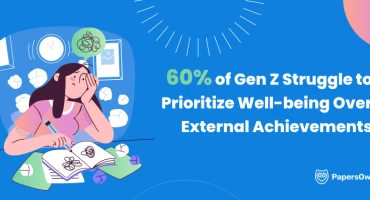We’ve all been there: the middle of a conversation, a question from your friend pops up:
What’s the rarest pet you’ve ever had?
“Fish,” you answer, taken by surprise. But as the conversation goes on, you clearly understand that it was your companion who wanted to answer it. How could you notice it? For example, by seeing how they launch a pair of Komodo dragons into their speech. The ones they used to have while living in their two-bedroom flat.
Simple story, yet the aftertaste takes away the desire to continue chatting.
This conversational quirk, known as boomerasking, has become so common that most of us have either encountered it or even done it ourselves without realizing it. In a nutshell, it’s about a situation when someone asks a question just to answer it themselves.
To better understand how this trend plays out, we surveyed 2,000 Americans aged 18-34 about their experiences with boomerasking, one-upping, and other common dialogue disruptions. What we found is that this behavior is widespread, often unintentional, and — perhaps unsurprisingly — annoying.
Key Findings:
- 84% of respondents said they have been boomerasked at least occasionally, with 33% encountering it frequently.
- 67% admitted to doing it themselves, though mostly on occasion.
- 94% agreed to some extent that they shift conversations toward their own experiences, even if unintentionally.

The data suggests that boomerasking isn’t necessarily a malicious act — it’s often just a natural conversational reflex. However, it doesn’t mean it goes unnoticed. Moreover, it doesn’t mean it should be ignored.
We’ve All Been There: We Asked, and We Answered
Survey results claim that 84% of respondents faced the boomerasking phenomenon. What’s interesting is that 14% managed to avoid it somehow. They either have a limited or very emotionally intelligent circle. Nevertheless, it’s what people do, and they seem to have no intention of stopping.

Did You Ever Catch Yourself Boomerasking?
We don’t know if respondents noticed it before or after our questions, but 67% still admit to asking questions while they wanted to answer them themselves. And avowing is a first step to allowing — allowing yourself to be a person who, yes, asks questions just to be asked mutually.
When you’ve acknowledged you’re boomerasking, you can now shift your attention towards questions like: “How can I contribute to a more two-sided conversation?” or “Why do I need to attract attention in such a subtle way?”

What’s More Annoying to Gen Z: Talking Too Much or Boomerasking?
It’s both, we’re afraid.
When asked which conversational behavior is worse:
- 29% disliked it when people only talked about themselves without asking anything in return.
- 14% found boomerasking more annoying than simple bragging or complaining (which is often the cause of boomerasking).
- 41% said both were equally frustrating.
- Only 16% weren’t really bothered by either.
This suggests that people aren’t necessarily against storytelling — they just want it to feel like an actual conversation, not a competition. Unfortunately, it’s hard for many people to acknowledge that they want to share something. They make up irrelevant strategies to make it sound more natural — the way they incorporate their outside story into the conversation. Well, somebody, please tell them…

The Biggest Conversational Offenders
We also asked respondents to rate how irritating certain behaviors were in conversations. Here are the top offenders:
- Interrupting constantly – 89% were at least moderately irritated by this.
- One-upping (always having a better story) – 49% found it highly annoying, and if we are to include mild irritation, the numbers spike to 84%.
- Fake listening (pretending to listen but not engaging) – 48% found this very irritating, with mildly irritated respondents added also reaching 84%.
- Boomerasking – 44% were highly or mildly irritated by it.
- Humblebragging – 60% were at least mildly irritated by it.
- Giving unsolicited advice – 70% found this bothersome.

But… Are We All Guilty?
Despite these complaints, the survey revealed that many of us are guilty of the same behaviors we dislike. Among respondents:
- 51% admitted to oversharing.
- 43% said they’ve fake-listened before.
- 35% have interrupted others constantly.
- 18% have actively one-upped someone in conversation.
The paradox is clear: While we find these habits frustrating, we also unconsciously engage in them.

Why Do We Do It?
There are a few possible explanations for why boomerasking and related behaviors happen so frequently:
- Keeping the Conversation Going – 27%
- Awkwardness or Social Anxiety – 25%
- Making a Point or Proving Something – 22%
- Processing Thoughts Out Loud – 21%
- Bringing Up a Specific Topic – 16%
- Seeking Validation or Attention – 12%
- Lack of Engagement from Others – 11%
- Using Humor or Sarcasm – 10%
- Checking for Truthfulness – 8%
- Impulse or Habit – 6%

How to Break the Cycle
If you’ve found yourself guilty of boomerasking (and chances are, you have), here are a few strategies to keep conversations balanced:
- Pause before responding – Instead of immediately jumping in with your own story, take a second to acknowledge what the other person said first.
- Ask follow-up questions – Show genuine interest in their story before relating it to your own.
- Be mindful of interruptions – If you catch yourself cutting in, redirect the focus back to the speaker.
- Embrace silence – Not every response needs to be a personal anecdote—sometimes a simple nod or “That’s interesting!” is enough.
The Takeaway
Boomerasking is a common yet often unintentional social habit. While it can be frustrating, our data shows that most people don’t do it out of malice—they simply want to connect. The key takeaway? If we all become more mindful of how we engage in conversations, we can create more meaningful, two-sided discussions.
So, next time you catch yourself about to boomerask, ask yourself: Am I responding to connect, or just waiting for my turn to talk?
Methodology: Researchers from PapersOwl surveyed 2,000 members of Generation Z and young Millennials to compile this study. Randomly selected participants were asked to discuss their experiences, with no emphasis on a specific gender, ethnicity, or social background.





